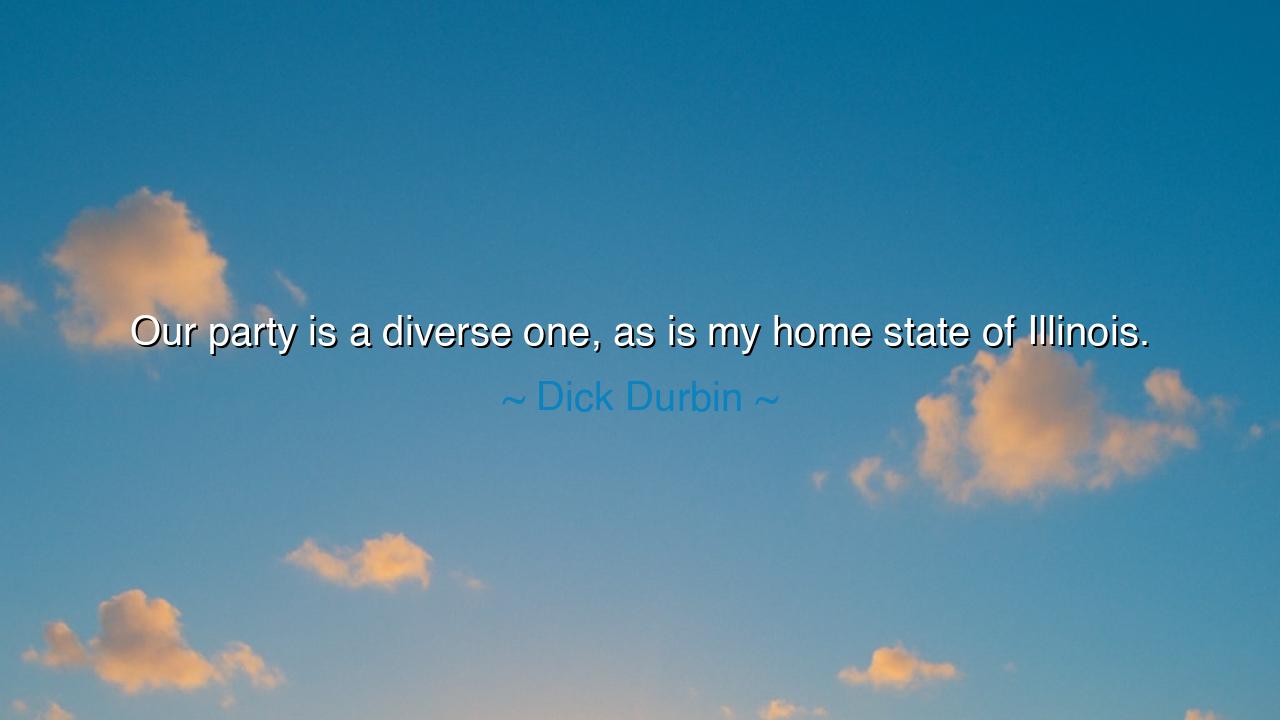
Our party is a diverse one, as is my home state of Illinois.






In the quiet cadence of civic devotion, a statesman utters a simple creed: “Our party is a diverse one, as is my home state of Illinois.” Hear the deeper music beneath those spare words. He invokes not a slogan but a lineage—the stubborn thread that binds one’s political house to one’s earthly household. To say a party is diverse because Illinois is diverse is to confess that conviction must be apprenticed to place; it must learn the grammar of neighborhoods, the accents of train platforms, the prayers whispered over factory whistles and beside prairie fields. So speaks Dick Durbin, anchoring national banner to local soil.
For what is Illinois if not a crossroads where many currents meet? Chicago alone is a vast, polyphonic city whose peoples have braided a thousand cuisines, tongues, and faiths into one restless skyline. The ledgers of demography are blunt about this variety; the mosaic of Chicago’s households and wards bears out the claim that diversity is not an ornament but an atmosphere, the very air the city breathes. Thus the senator need not embellish—his home state itself is the witness.
Yet the river that feeds this mosaic was not born yesterday. In the last century, the Great Migration carried families northward, out of the heat and hazard of Jim Crow, toward union halls, schoolhouses, and a new vocabulary of citizenship. Chicago received hundreds of thousands, and the state was remade in cadence and conscience. That history is no footnote; it is a root system. When Durbin names Illinois as diverse, he is naming the courage of those travelers and the neighborhoods they raised from song and struggle.
Consider, as a living parable, another son of Illinois—a young state senator who spoke in 2004 of hope large enough to hold many kinds of Americans. From that Chicago podium his voice rang far, and a country learned again that the center can be a meeting-place, not a narrowing. The stage, the speech, the city: all were instruments of a plural promise. Diversity was not theory; it was the crowd itself, gathered under one roof, listening for a future they might share.
The quote’s origin is therefore double: part personal oath, part historical mirror. On one side stands the party, which must widen its tent flaps or wither; on the other stands the home state, whose daily life—markets, parades, vigils, school-board quarrels—teaches the discipline of coexistence. Between them stretches the citizen’s duty: to make the mechanisms of power answer to the music of the people. So long as Illinois contains multitudes, any party that would represent it honestly must learn multitudes’ manners.
But such learning is not painless. Diversity is a generous tutor and a stern one. It asks that we argue cleanly, translate generously, and measure victory not by the silencing of opponents but by the enlargement of what we can do together. It demands that platforms be sidewalks, not pedestals—that the party walk the blocks it claims to love. The senator’s sentence is thus a charge to his own: let your coalitions resemble the corner grocery more than the drawing room; let committee rooms feel like train cars at rush hour, where strangers stand shoulder to shoulder and still arrive.
Take, then, the teaching and carry it like a precinct map folded into your breast pocket. If your home state is diverse, make your habits match it: read beyond your comfort; canvass beyond your district of the mind; invite into your table someone whose story edits your assumptions. If your party is diverse, make your leadership multilingual—in policy and in posture—so that each voice finds itself not merely tolerated, but required. In this way, the line spoken of Illinois becomes a liturgy for any commonwealth: many streams, one river; many hands, one harvest; many stories, one house wide enough to hold them.






AAdministratorAdministrator
Welcome, honored guests. Please leave a comment, we will respond soon